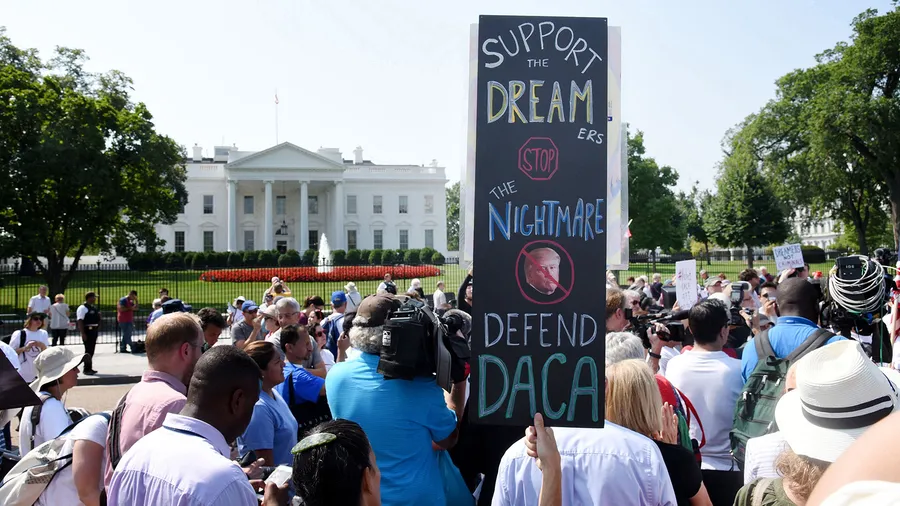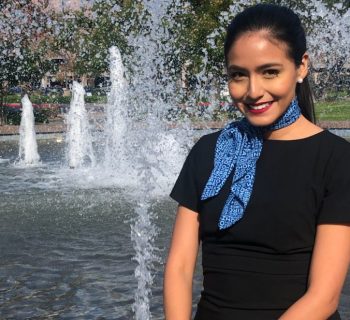A team of researchers conducted the study on 50 Tampa Bay residents living in limbo as threat of deportation looms.
By Lauren Peace | Tampa Bay Times | NOV. 2, 2022 | Photo by Olivier Douliery
In 2016, University of South Florida researcher Elizabeth Aranda was wrapping up a project on young adult immigrants. She had conducted interviews with troves of people, all willing to share their stories of life without permanent legal status.
But on the morning that former president Donald Trump was elected, something changed. One of Aranda’s interview subjects didn’t show up for a scheduled meeting. In fact, she never heard from him again. It kept happening.
Throughout his campaign, Trump had made a crackdown on immigration a key issue. He promised harsher penalties for people living in the United States without permanent legal status, and crushed the hope that many carried for a path to citizenship.
His takeover resulted in new waves of fear and uncertainty for immigrants — especially for those who arrived to the United States as children and had been granted protections under former President Barack Obama that Trump was aiming to undo.
“It got me thinking, ‘How are people in precarious legal status going to negotiate the next four years?’” Aranda recalled.
It’s the question that rests at the center of a research paper published this summer by Aranda and her collaborators Elizabeth Vaquera, Heide Castañeda, and Girsea Martinez Rosas.
Over multiple years, Aranda and her team interviewed more than 50 young adults from the Tampa Bay area who were living under the Deferred Action for Childhood Arrivals program (DACA), as it came under threat of elimination. The goal was to understand the toll of uncertainty around their immigration status.
The majority of participants reported their mental health declined as a result of stress because of threats to the program and their status. About 20% reported suicidal thoughts. Half of the sample said they had engaged in some form of self-harm.
TheDACA program, which was implemented by the Obama administration in 2012, provides protections for immigrants who arrived in the United States as children — many of whom know no other home.
Under the act, these “Dreamers” are protected from deportation, granted work permits and can pursue higher education. But the program stops short of providing a path for permanent residence, and has faced frequent threat of elimination over the last near-decade.
The result has been a life in limbo for the more than 24,000 DACA recipients in Florida — and hundreds of thousands nationally — who are forced to live court case to court case, in constant fear of having their protections revoked. They’re people like Hillsborough County resident Nanci Palacios, who immigrated from Mexico when she was 6 years old.
Palacios, 33, participated in Aranda’s study.

Like many interviewed, Palacios said that threats to the program and fear of deportation changed the way she lived and the choices she made.
Making money became her top priority. She worried about saving up in case she was forced to leave the U.S., a threat that changed how she thought about her future.
She stopped going to college so she could work. She didn’t buy a home when they were still in her price range, back before a record rise in housing costs. She worried about losing her health care.
“Everyday you live in fear,” Palacios said. “That takes a toll on the entire family. It hurts.”
Her experience is representative of the greater themes realized in Aranda’s research.
The study found that uncertainties about the future affected work and educational outcomes for DACA recipients. It also impacted feelings of belonging.
Aranda found that participants talked about the potential end of DACA in a way that mirrored the way people living with terminal illness talk about the looming end of life.
“It is a form of trauma,” Aranda said. “Now, imagine if we actually lost DACA. This could possibly amount to a public mental health crisis among this population.”
But another finding of Aranda’s research was increased civic engagement among recipients.
That’s because the need to advocate for greater protections is more important than ever, said Cirenio Cervantes, another participant.
Like Palacios, Cervantes also emigrated from Mexico as a child. Cervantes, 29, was a teenager working on a farm in Michigan when the deferred action program first went into effect. Now, he’s a graduate student, studying public health in Florida.

At the time, he wasn’t involved in advocacy work, he said. But when attacks on the program became more serious after 2016, Cervantes said, he realized a need to speak out. He didn’t have the option of staying quiet.
“Uncertainty continues to haunt us every day,” Cervantes said. “It’s my hope that we continue to highlight the stories that are often left in the shadows and advocate for permanent residence.”







